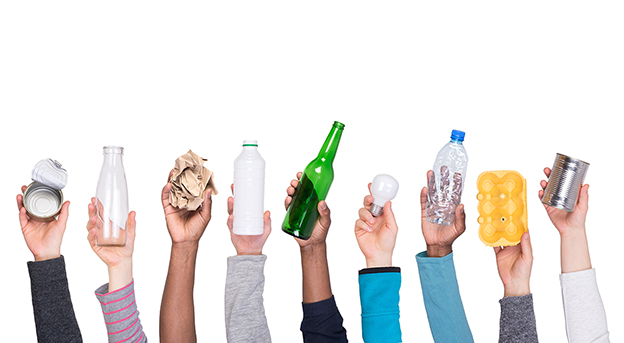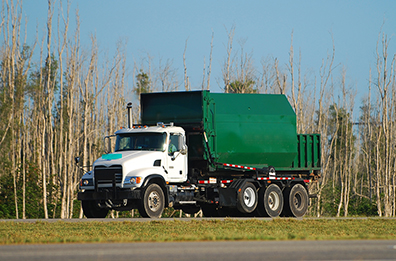
Items Suitable for Recycling
Many items are suitable for general recycling and diversion programs. Typical general recycling candidates include:
- Metals such as Steel, aluminum, copper, nickel etc
- Food waste / organic waste
- Wood waste
- Cardboard
- Paper
- Plastics
- Glass
- Concrete
- Asphalt
- Shrink wrap
Realistic Recycling
General recycling initiatives must make economic sense. It costs money to collect, sort, process, transport and market any commodity or product. There must also be a demand for that product, or else nobody will purchase it. This is especially true for recyclable materials.
For example, wood waste can be chipped and used for animal bedding or as a decorative landscape cover. Wood can also be processed and mixed for use with organic composting programs. Some cities will even take green yard waste and use it in a composting program. Metal and tin can be collected for recycling. Plastics can be suitable for recycling, but there are exceptions to the type of plastic that can be recovered. Shrink wrap can be recycled when there are sufficient quantities to justify a baler or compactor. It all depends on where you are located and the level of market demand for recyclable waste materials.
Waste in Motion believes in developing general recycling strategies for businesses, corporations and multi tenant residences that are:
- Implementable
- Sustainable
- Scalable and
- Realistic

THE THREE R’s
Most adults and children can recite the fundamental three “R’s” of the recycling philosophy, namely to REDUCE, REUSE and RECYCLE. Diverting waste from our landfill waste stream is a good thing, for sure. But reducing your consumption, and reusing your material are the first steps towards enacting a practical waste reduction strategy. Recycling is always last.
In recent years, there have been attempts to add a fourth ‘”R” to the recycling triangle (which would then make it a square, but that’s another matter entirely). We feel that the good old 3R Triangle that has served us so well for many years is still relevant, easy to learn and practical to implement.
REDUCE
Reducing your consumption is the easiest option to implement and requires the least energy. Stop creating waste and you don’t have a problem!
If you’re a little older, you might remember that computer software used to come in huge display boxes within which you could fit dozens of CD disks! As time went on, those boxes got smaller, until they pretty much disappeared with the advent of cloud based downloads. So continuously reducing the packages eventually eliminated the disposal of those boxes.
But that’s not always possible when materials require packaging to be transported to consumers. Vegetables might not be packed in individual plastic bags when shipped to the grocery store, but they still require a shipping box to be safely transported.
As a consumer (or business), you can make choices to reduce your consumption.
REUSE
Reusing an item is the next best thing. Things like clothes, furniture, household appliances, metal cutlery can be reused again and again. Wood scraps can be repurposed or reused into furniture, chess boards, knife holders or what have you. The automotive industry has a well established system of reusing auto parts from scrapped vehicles.
The trend towards using cloth bags for your groceries has led to a lowering of single use plastic bag consumption. But eventually, even those items wear out, and it becomes time to enact the last option.
RECYCLE
Recycling may appear to be the easiest option to enact, simply because you can throw something into a recycling bin and it will magically be “recycled”. Some items make sense to be recycled. Think of the energy and effort that goes into creating metal from rock ore; it’s massively energy dependant. It makes sense to recycle metals such as steel, iron, aluminum, copper etc. as we can refashion it into countless products again and again. The scrap metal markets are well established, and provide a conduit through which material can be bought, sold, traded and shipped to end users.
Electronics are now in demand for recycling, as many of them contain gold, nickel, copper, silver and platinum, as well as lesser known (but high demand) metals such as gallium, indium, and niobium.
Recycling Confusion
Just because we can recycle something, doesn’t necessarily mean we should recycle it. There is no point expending energy to recycle a material if it doesn’t have an end use. A prime example is the fallacy in thinking that we can solve our waste management issues simply by collecting “recyclable” material. The solution is much more complex when you look at challenges such as end market demand stability, contamination, material volumes, transport distances, fuel prices, land costs, labour costs, political considerations etc. These are all key factors that must be managed and integrated for a successful recovery plan.
If the end use demand is high and there is a developed market for that commodity (like scrap metals), it makes sense to recycle that material. Or if the energy expenditure to create the virgin product is very high (like concrete) it will also make sense to reuse or recycle that product. Sometimes you can get paid for the recyclable material; sometimes you have to pay to recycle the product. Any way you look at it, recycling is not free; it costs money to collect, transport, sort, process, stockpile and distribute that material.
There has to be a conduit for collection and most importantly, an end market for recycled products. If nobody wants that material, it doesn’t really make sense to expend effort, money and energy in those recycling initiatives.
We aren’t saying just toss everything into the trash and don’t recycle! We’re simply pointing out that not every recycling idea or proposal is economically viable.

Contact us today to find out more!
1 (587) 355-7242
solutions@wasteinmotion.com
www.wasteinmotion.com